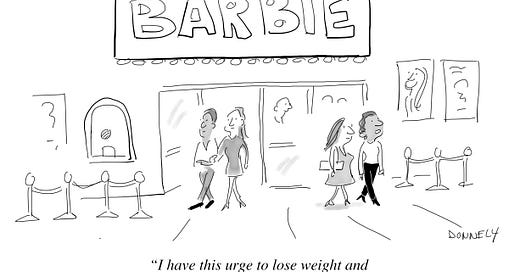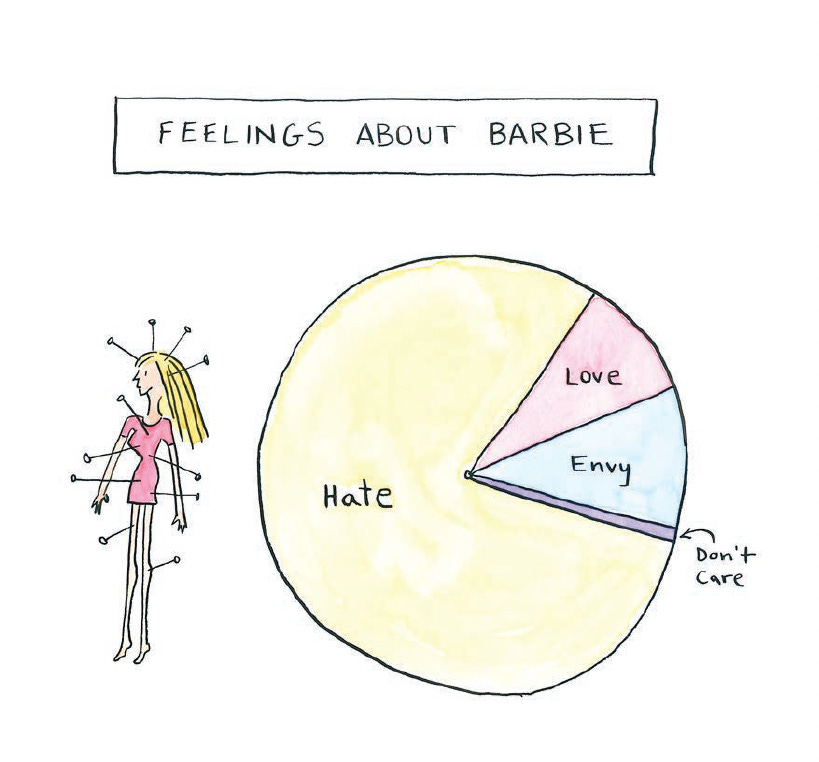As promised, here are my thoughts about the Barbie Movie. I may come across as angry here, but I don’t mean to insult anyone. I know it’s just a movie, entertainment. But these kind of mass market products —Barbie, and now I might argue, the movie— are in part what have caused so many problems for women over the years. There are some good “messages” in the movie amidst the fun, I love that. If they help some understand, then all the criticism I put forth here may not be important. I haven’t read any reviews yet, so as not to color my thoughts.
The movie gave me some laughs, and I particularly liked the performances by Ryan Gosling (Ken) and Kate McKinnon (Weird Barbie). But I came out of the theater feeling like I had been manipulated by a corporation.
There are many who love Barbie, I know, and I don’t mean to criticize those people at all —Barbie has been a catalyst for imaginative play for many people. That’s amazing and wonderful.
But what about all the little girls who have been negatively affected by the doll, who were made to question their beauty every single day of their lives because of Barbie? I did not have Barbies growing up, my mother would not buy them and I was not interested in them (my mother hated Disney, too). I played with little toy bears. The culture of the 1960’s for young girls was toxic ( I am of that generation), and Barbie was part of that. I felt it and still carry it with me.
Here are some specific thoughts on the movie. Spoiler alert if you haven’t seen it.
For me, the movie did not really address that the doll makes impressionable young girls question their beauty. It makes it clear that Barbie can be anything— do any job—and that’s great. The movie promotes the idea of equality for women, as long as they look good and are thin.
In the movie, there were many Barbies, but mostly only of one shape, the one we all know her to have: skinny. I only saw one larger-shaped Barbie. There were no ordinary-sized Barbies, shaped like most women. Also there was only one disabled Barbie; happily there were many different shades of skin-toned Barbies.
Throughout, and particularly at the end, the movie perpetuates the construct that it’s men vs women, ALL THE TIME. Aren’t we trying to get past that?
There was way too much time spent on Barbie apologizing to Ken for ignoring him all these years, making him feel better. It’s a nice (and at times amusingly done) sentiment, but it’s confusing to spend so much time on this.
I thought the mother character played by America Ferrara was interesting, and I thought her speech towards the end was good. But it felt like director Greta Gerwig wanted to be sure to get as many feminist points expressed at one time in order to whitewash any of the overtly pink/girly/confusing messages that happened up to that point.
Barbie talking to the old woman (who looks to be around 90 ), telling her that she’s beautiful was very sweet. Barbie doesn’t see age, apparently. But what does it say about the creeping way our culture makes women invisible because they are considered not beautiful after 35? It felt disingenuous.
When Barbie was working towards the end to make everything “normal” again (try to figure out what normal is in the movie), she approached Physicist Barbie, and said, “you want pants, right?” Why would a physicist want pants, and not another Barbie? It’s putting us into categories as if to say, if you are a scientist, then you must not want to wear a dress and be “girly.”
The teenage daughter character was interesting, rebelling against her mother— she’s a teen after all. She hates Barbie (something her mother used to love), and she wears loose, black pants and a baggy grey sweatshirt. She speaks her mind and is a little angry. By the end of this story line, she’s wearing tight fitting pink clothes and being agreeable to everyone. And, miraculously she and her mother develop a bond over a love for Barbie. I am sure this is true and I don’t mean to disparage anything that can bring a mother and daughter together. But that Barbie can even save mother-daughter relationships— it’s a feel-good subtext that felt manipulative.
I loved the notion of Weird Barbie, but why is she called “weird” and not Creative Barbie? Children who cut their doll’s hair and paint her skin with colors are being creative, seems to me.
The history of the doll is a thread throughout, as are the clothes that consumers have bought over the years. I assume they are real outfits that are showcased from the past, and fans in the movie theater can spot their favorites. Additionally, the founder of Barbie is a character; the movie makes a point to tell us that Ruth Handler was not perfect, she had tax issues. But they use her as if to say, “Barbie was founded by a woman!” Does that makes Barbie inherently okay, perhaps foundationally feminist? Is that the point?
Finally, men were made to look way too mean, too clueless in order to make Barbie look good. I am the first to say I hate the patriarchy; but I love men. Many, many men are our allies who do not participate in the patriarchy. Many women do participate in the patriarchy. Again, it’s not men vs women. Yes, men created the system, but it is perpetuated by women as well as men. And that’s what I think this movie does. It makes feminism seem cute. Let’s color it pink! Let’s buy more clothes and more Barbies.
Finally, there’s this headline from the Guardian: “Greta Gerwig has made history as Barbie scored a US$356m (£276m, A$527m) opening weekend around the world, making it the biggest debut ever for a film directed by a woman.” I can’t imagine directing a movie, I am in awe of Great Gerwig’s talent. But is this really a ground-breaking achievment when you have a captialist machine behind the film?
It’s about money, folks.







Who needs Barbie when we have role models like YOU! Bravo Liza; for your genuine and heartfelt reckoning.
Thank you for this! There is so much gushing and emoting about Barbie from the public and from the critics, it’s so good to read something more critical (from someone who as actually seen the movie). I’m looking forward to reading Anthony Lane’s take on it.
And yes, will go see it at some point.